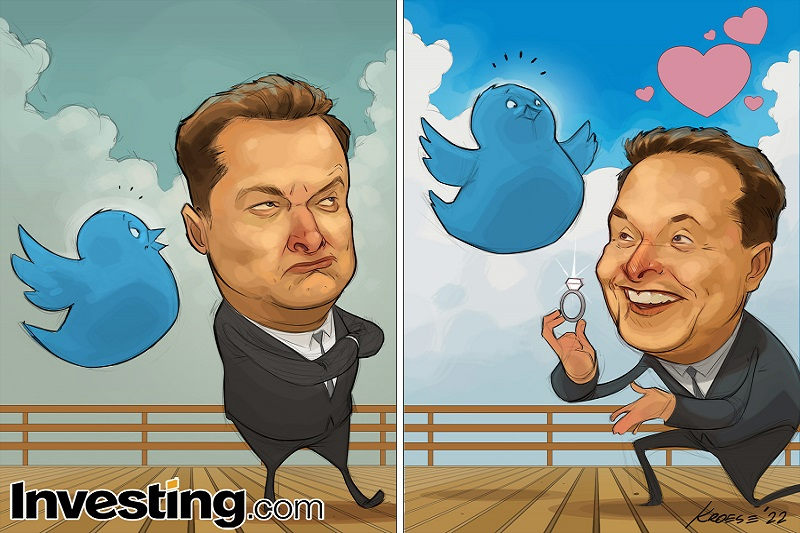By Geoffrey Smith
Investing.com -- Elon Musk is on the hook for Twitter (NYSE:TWTR) and the wriggling is getting more and more frantic.
A week after legal pressure drove the Tesla (NASDAQ:TSLA) CEO to renew his offer for the social media site, Twitter’s stock still trades at $50.07 a share, some 7.3% below the $54.20 a share offer price, which values it at a whopping $44 billion.
True, Musk’s sense of buyer’s remorse must be acute: the deal seemed too rich even in April when he first made it. Since then, the Nasdaq has tanked 20%, leaving Twitter looking even more expensive than it did then. Its closing price Tuesday was over 40 times next year’s expected earnings.
A contract is a contract, and Delaware courts – where Twitter is pressing its suit for Musk to complete – have a solid track record of enforcing them (the trial has been suspended until November to allow the parties to complete the deal). As such, the banks corralled together by Morgan Stanley (NYSE:MS) to lend Musk $13 billion for the deal are unlikely to ride to the rescue, even though they are set for huge losses when the time comes to find buyers for bonds that will pay a maximum of 11.75% in a world where even safe interest rates are exploding higher. Twitter's operations have lost $1 billion over the last four quarters, so where the money to serve the debt will come from is something of a mystery.
The odds that Twitter’s creditors will end up having to convert their bonds into equity before long are shortening by the day. But the buyout business is competitive, and the reputational damage to any of the banks that renege on their commitment to finance the deal will far outweigh any money they may save in the short term by pulling out.
So if business sense can’t save Musk and the law won’t save him, Musk will have to seek salvation from another direction. The only realistic one is politics.
There are many possible ways for Washington to intervene. Many would plainly not like to see Musk – currently still the world’s richest man – own a site with such a broad reach. Some on the left clearly do not want him to be wielding such a powerful media tool in the runup to elections in November, and beyond.
If only…if only…if only there were a way to persuade people that Elon Musk is not a fit and proper person to buy Twitter? What would regulators and politicians say, for example, if it turned out that Musk had been conducting private diplomacy with the nemesis of the free world – and then lobbied for that person’s interests?
Musk’s foray into trying to stop Russia’s war in Ukraine had seemed weird enough at first sight, with his more or less uncritical adoption of Vladimir Putin’s negotiating positions, which amounted to a vote of support for Putin’s nuclear blackmail tactics. That was, at the very least, inconsistent with the effective and very expensive support offered to Ukraine through his Starlink network of satellites earlier this year.
However, the episode took a turn for the weirder on Tuesday thanks to Ian Bremmer, the ubiquitous rent-a-quote who heads the political risk consultancy Eurasia Group. Bremmer claimed that Musk told him he had spoken to Putin personally before posting his suggestions, which included forcing Ukraine to accept the loss of Crimea and adopt permanent neutrality, as well as re-running “under UN supervision” the sham referenda held at Russian gunpoints in four provinces of Ukraine at the end of last month. The Kremlin, which welcomed Musk’s proposals, had used those votes as the pretext for annexing the provinces last week.
Musk denied saying any such thing, saying he has only once ever spoken to Putin, 18 months ago, on the subject of space.
“nobody (sic) should trust bremmer,” Musk added for good measure.
However, Putin already has form for using others to float balloons for him: former German Chancellor Gerhard Schroeder conveyed a similar message of Putin’s alleged desire for peace during the summer in an interview with Germany’s Stern magazine.
And Musk, for his part, already has form in being economical with the truth himself: the discovery process for the Delaware trial found evidence that Musk had destroyed evidence of an exchange on the messaging app Signal about the Twitter deal. So believe who you will.
There is also something distinctly fishy about Musk’s comments recently that buying Twitter would be the first step to making it an “everything app”, the sort of ubiquitous, WeChat-like platform that has printed money for Tencent (HK:0700) over the last decade.
What’s fishy is that that model is already in disgrace in China, where antitrust regulators have hit back hard at Internet platform companies, and that Washington has already squashed Mark Zuckerberg’s attempts to take Facebook (NASDAQ:META) in that direction with the launch of a native stablecoin. Musk knows very well that the idea of app X, as he called it, is vintage Web 2.0, the embodiment of a model with no future in the U.S. He might as well have held up a flag saying “I’m an aspiring monopolist – ban me!”
Some would no doubt see it as far-fetched conspiracy theory to suggest that Musk is inviting political intervention to save him from his own hubris.
However, as ideas go, it is still not much stranger than the idea that Twitter was worth $54.20 a share in the first place.
